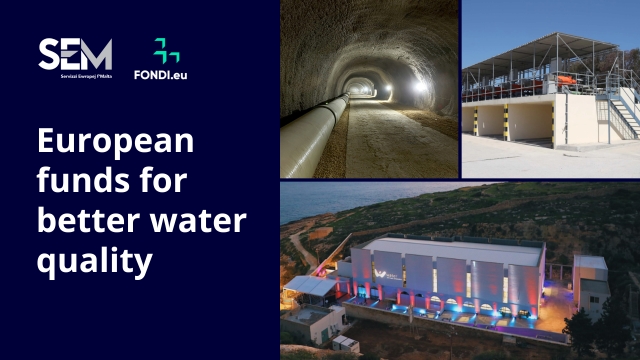
Tista’ taqra bil-
Malti.
Due to the geographical position of our country, with low levels of rain and high temperatures, the scarcity of water is natural in Malta. In fact, Malta has the lowest available amount of natural freshwater per capita among all EU Member States. In addition, Malta ranks among the 10 countries in the world with the highest water-scarcity.
When it come to the ways in which EU funds are used, the water sector is one of the key priorities for Malta. In this regard, through EU funds, the Water Services Corporation has carried out and is carrying out several investment projects to improve the water availability and infrastructure.
Recently, EU funds enabled the completion of a project to improve the production of New Water. Through this project, 398 farmers will benefit from a stable supply of such water that has undergone regeneration so that it can be used for irrigation. This project consisted of an investment of around €25 million from EU funds in three new plants that treat water for irrigation, making it possible for our country to adopt more sustainable practices in the use of water.
In this regard, the ‘Net Zero Impact Utility’ project, with an allocation of €150 million from European funds, aims to change the way water is processed and distributed throughout Malta and Gozo to improve the conservation of groundwater and the sustainability of the water supply.
Through co-financing of EU funds in a €36 million project, a 9.4km underground tunnel has been builtfrom the Reverse Osmosis plant in Pembroke to the Ta’ Qali reservoirs. This tunnel will transfer 52,000 cubic meters of desalinated water per day and will change the way drinking water is distributed and mixed, resulting in improved quality of water throughout the Maltese Islands. The system will also reduce operating costs and increase security of supply since most areas will be fed without the use of pumps, resulting in better energy performance and continuity of supply even during power failures. The system also reduces the use of chemicals that optimise the quality of drinking water.
Another investment of €11 million through EU funds is the development of the first Reverse Osmosis plant in Gozo. This plant has the potential to produce 9,000 cubic meters of water per day and eliminate the use of the existing underwater pipe from Ċirkewwa. In this way, the provision of high-quality water that reaches homes and businesses in Gozo becomes self-sufficient.
With an investment of another €10 million, the Water Services Corporation has also completed the Qattara reservoir project in Qrendi, with the aim of improving the quality of drinking water and reduce the dependency on groundwater.
A project was also carried out in the Sant’ Antnin Treatment Plant, with an investment of around €5 million from European funds, allowing farmers to dispose of farm waste in a more sustainable way, leading to increased production of New Water. Through retrofitting with new technologies in this plant, the sewage is being treated before it reaches the Ta’ Barkat sewage treatment plant, where more New Water can be processed as the load diminishes.
All in all, these projects will not only lead to drastic improvements in water conservation, but will also lead to better energy efficiency, more sustainable practices and better-quality water for everyone living on the Maltese Islands.
If you would like more information about EU funding opportunities, you can contact us with your questions via email at info.sem@gov.mt, or by calling us on 2779 7300. For more information you can also visit the website fondi.eu.
content supplied by Servizzi Ewropej F’Malta (SEM)








